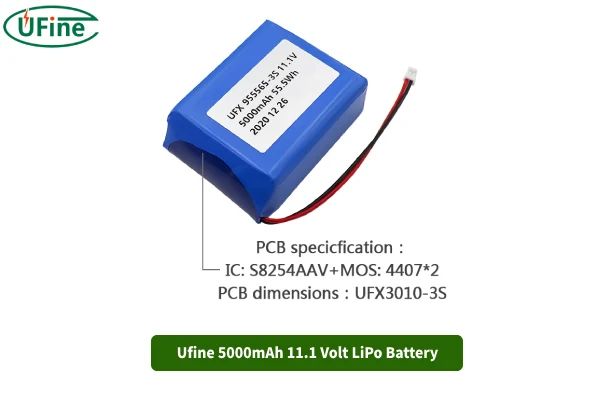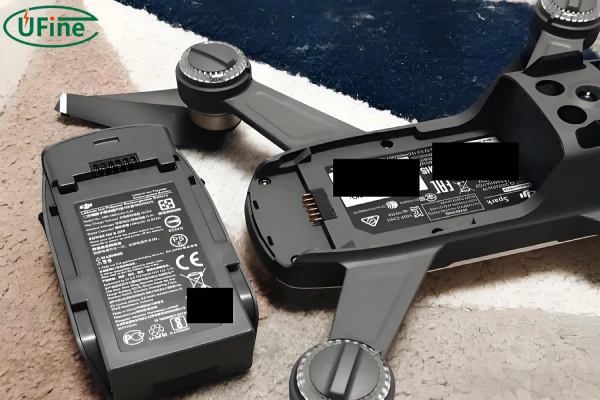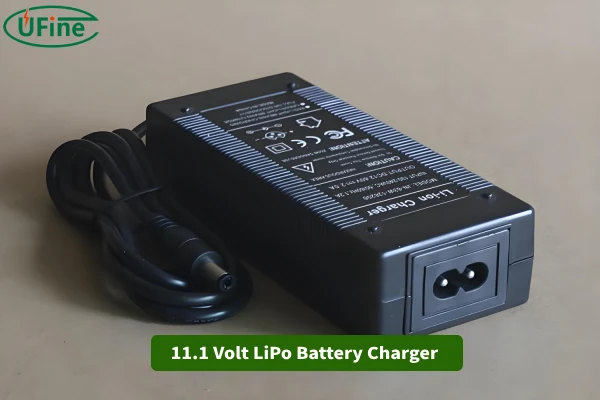Part 1. What is an 11.1 Volt LiPo battery?
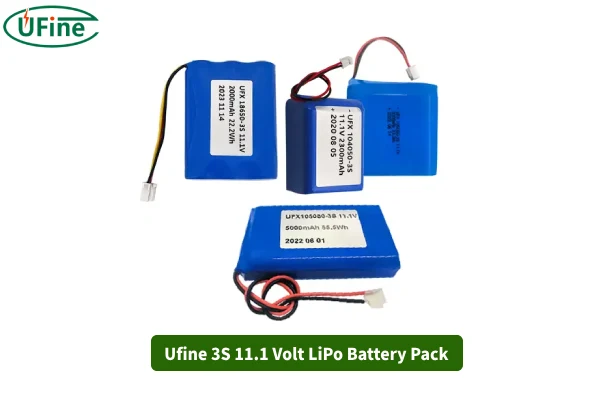
Let’s break down what an 11.1 volt LiPo battery actually is. An 11.1 volt LiPo battery, often referred to as a 3S LiPo battery, is a type of lithium polymer battery. It consists of three cells connected in series, each with a nominal voltage of 3.7 volts. When you add up the voltage of these three cells (3.7V + 3.7V + 3.7V), you get a total of 11.1 volts.
LiPo batteries are known for their high energy density, which means they can store a lot of energy in a relatively small and lightweight package. This makes them perfect for applications where weight and space are crucial, like in RC models and drones. Plus, they can deliver high current, which is essential for powering motors and other demanding components.
But there’s more to these batteries than just their voltage and cell structure. LiPo batteries are also praised for their versatility and performance. They come in various sizes and capacities, so you can find one that fits your specific needs. Whether you’re flying a drone, racing an RC car, or building a DIY electronics project, there’s an 11.1V LiPo battery out there for you.
Part 2. Key specifications of 11.1V LiPo batteries
Voltage, Capacity, and Discharge Rate
The 11.1V LiPo battery typically comes with different capacities, usually ranging from 1000mAh to 5000mAh or more. The capacity of the battery determines how much energy it can store, and the higher the mAh rating, the longer the battery will last before needing a recharge.
- Voltage: 11.1V nominal voltage with a peak voltage of 12.6V when fully charged.
- Capacity: The most common ranges are 2200mAh, 3000mAh, and 5000mAh. For example, a 3000mAh LiPo battery typically lasts longer in drones than a 1000mAh battery.
- C-Rating: This rating indicates the maximum continuous discharge rate of the battery. A higher C-rating means the battery can handle more current without damaging itself. For instance, a 30C rating means the battery can discharge at 30 times its capacity (30 * 2200mAh = 66A).
Part 3. Why 11.1V?
You might be wondering, why exactly 11.1 volts? The answer lies in the way the battery cells are arranged. Each lithium polymer cell in a LiPo battery has a nominal voltage of 3.7 volts. When you connect three of these cells in series, their voltages add up. This series configuration (3.7V + 3.7V + 3.7V) gives you a total voltage of 11.1 volts.
This 3-cell arrangement is quite common because it strikes a good balance between voltage and size. The 11.1V output is ideal for many hobby and professional applications, providing enough power without being too bulky. It’s also worth noting that the actual voltage of a fully charged 3S LiPo battery is around 12.6 volts (4.2V per cell), but 11.1 volts refers to the nominal or average voltage.
Why 11.1V and Not 12V?
A common question users often ask is why 11.1V is used instead of 12V. The answer lies in the internal chemistry of LiPo batteries. Each cell in a LiPo battery provides a nominal voltage of 3.7V, and with three cells connected in series, the resulting voltage is 11.1V. The peak voltage when fully charged reaches 12.6V. While 12V is a rounded figure, using 11.1V provides a safer and more stable range for battery performance.
Part 4. 11.1 V LiPo battery use
So, where exactly do you use these versatile power packs? Here are some common applications for 11.1V LiPo batteries:
- RC Models: Whether it’s cars, trucks, boats, or airplanes, 11.1V LiPo batteries are a staple in the RC world. They provide the high power needed for fast speeds and long run times, making your RC adventures more thrilling.
- Drones: Drones, especially those used for racing or aerial photography, benefit greatly from the lightweight and high energy density of LiPo batteries. An 11.1V battery can offer the perfect balance of power and endurance, allowing for longer flight times and better performance.
- Airsoft Guns: Many airsoft enthusiasts use 11.1V LiPo batteries to power their electric guns. These batteries can significantly increase the rate of fire and overall performance of the gun, giving players an edge in the game.
- DIY Electronics: If you’re into building your own gadgets, an 11.1V LiPo battery can be a great power source. From robots to portable electronic devices, these batteries can handle a variety of projects.
- Backup Power: They are also used in small backup power systems and portable power banks. Their ability to deliver high current and store significant energy makes them suitable for emergency power supplies.
At Ufine Battery, we specialize in producing customized LiPo batteries, including 11.1V LiPo cells for use in drones and RC cars. Whether you need specialized dimensions or higher capacities, we can help create the perfect power solution for your equipment.
11.1V LiPo Batteries for Airsoft
Another major application of 11.1V LiPo batteries is in airsoft guns. Airsoft enthusiasts prefer these batteries due to their ability to provide high power output, enhancing firing rates and consistency. Using a high-C LiPo battery in an airsoft gun ensures more efficient energy transfer, allowing players to have more power at their disposal.
Part 5. Proper storage voltage for 11.1v LiPo batteries
Storage is one of the most important aspects of maintaining the lifespan of a 11.1V LiPo battery. It is recommended that LiPo batteries be stored at a 3.8V per cell charge level, which is approximately 11.4V for a 3S 11.1V LiPo battery. Storing your battery at full charge or too low a voltage can shorten its lifespan or even cause safety issues.
When storing a battery for long periods, ensure it is kept in a cool, dry place, ideally at temperatures between 5°C and 25°C. Extreme heat or cold can lead to degradation of the battery’s internal structure and capacity.
Part 6. How to charge your 11.1V LiPo battery
To safely charge a 11.1V LiPo battery, always use a charger that is specifically designed for LiPo chemistry. A LiPo battery charger ensures each cell in the battery is charged correctly, preventing overcharging, which could result in thermal runaway.
- Charging Rate: Most manufacturers recommend charging at a 1C rate, meaning the charging current should match the battery’s capacity. For example, a 3000mAh battery should be charged at 3A.
- Charging Safety: Always charge your 11.1V LiPo battery in a LiPo safe bag and monitor the charging process to avoid risks of overheating.
When charging your battery, always follow these steps:
- Choose the Right Charger: Ensure the charger is compatible with your 11.1V LiPo battery.
- Prepare the Battery: Check the battery for any damage. Damaged batteries should not be charged.
- Connect the Charger: Attach the charger’s leads to the battery terminals. Make sure the connections are secure.
- Monitor the Charging Process: Keep an eye on the battery while it’s charging. Never leave a charging battery unattended.
- Disconnect Safely: Once the battery is fully charged, turn off the charger before disconnecting the leads.
Part 7. 11.1 Volt LiPo battery charger
Charging your 11.1 volt LiPo battery correctly is crucial for both safety and longevity. Here are some common types of chargers you might encounter:
- Balance Chargers: These are the best option for LiPo batteries. They ensure each cell within the battery is charged evenly, preventing overcharging and extending the battery’s life. Balance charging is essential for maintaining the health of your LiPo battery, as it keeps the cells balanced, ensuring they all reach the full charge and discharge levels simultaneously.
- Smart Chargers: These chargers come with built-in safety features like overcharge protection, temperature monitoring, and automatic shut-off. Smart chargers are user-friendly and can adapt their charging process based on the condition of your battery.
- Fast Chargers: If you’re in a hurry, fast chargers can recharge your battery quickly. However, frequent use of fast charging can reduce the battery’s lifespan, so it’s best to use them sparingly.
- USB Chargers: Some smaller 11.1V LiPo batteries can be charged via USB, which is convenient for on-the-go charging. These chargers are usually slower but very handy when you don’t have access to a standard charger.
Part 8. How long does 11.1 V LiPo battery last?
The lifespan of an 11.1V LiPo battery can vary based on several factors, including usage, charging practices, and storage conditions. On average, you can expect about 300 to 500 charge cycles from a well-maintained LiPo battery. However, this number can be higher or lower depending on how you use and care for the battery.
To maximize the lifespan of your 11.1V LiPo battery, consider these tips:
- Avoid Deep Discharges: Try not to let the battery drain completely before recharging it. Deep discharges can stress the battery and shorten its lifespan.
- Use a Balance Charger: This ensures each cell is charged evenly, preventing overcharging and extending the battery’s life.
- Store Properly: When not in use, store the battery in a cool, dry place. Avoid extreme temperatures, as they can reduce the battery’s lifespan.
- Regular Maintenance: Check the battery regularly for any signs of damage or wear. If you notice swelling, leaks, or other issues, it’s best to replace the battery.
With proper care, an 11.1V LiPo battery can last for about 1-2 years, even with moderate use. Keep in mind that performance will gradually degrade over time, so you might notice shorter run times as the battery ages.
Part 9. FAQs
-
Can I use a 11.1V LiPo battery for other devices apart from RC cars?
Yes, an 11.1V LiPo battery is versatile and can be used for various applications beyond RC cars, including drones, electric skateboards, and certain power tools. However, it’s important to ensure that the voltage and current requirements of the device match the battery’s specifications to avoid damage or inefficiency. -
How do I know when my 11.1V LiPo battery is fully charged?
Most modern 11.1V LiPo battery chargers come with built-in indicators such as LED lights or digital displays that show the charging status. Typically, when the LED turns green or the display shows 100%, the battery is fully charged. Additionally, some chargers have automatic cut-off features to prevent overcharging. -
Can an 11.1V LiPo battery be used in cold temperatures?
LiPo batteries, including 11.1V models, perform less efficiently in cold temperatures. The chemical reactions inside the battery slow down, reducing both its capacity and the power output. It’s recommended to keep your battery in a warm environment before use and avoid discharging it heavily in freezing conditions to extend its lifespan. -
How do I store an 11.1V LiPo battery for long periods?
For long-term storage, it’s best to store the 11.1V LiPo battery at around 40-60% charge. This helps prevent damage from over-discharge or overcharge. Additionally, store the battery in a cool, dry place, away from heat sources, and ensure that the battery is kept in a fireproof container for safety. -
Is it safe to discharge an 11.1V LiPo battery completely?
It is not advisable to fully discharge a 11.1V LiPo battery. LiPo batteries are sensitive to deep discharges, which can damage the cells and reduce their overall lifespan. Always try to keep the charge above 20-30% and recharge before it gets too low to maintain optimal performance and longevity.
Related Tags:
More Articles
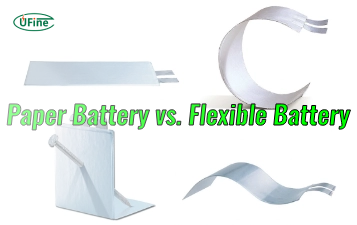
Paper Battery vs. Flexible Battery: What’s the Difference and Which Is Better?
Paper vs. flexible batteries: learn the key differences, benefits, and which power source fits best for wearables, sensors, and smart tech.
What to Know Before Buying a Tiny LiPo Battery for Your Project
Tiny LiPo batteries are powerful and compact. Learn how to choose the right one for your project with specs, safety, and charging tips.
Bloated LiPo Battery: Will It Explode?
Will a bloated LiPo battery explode? Discover the causes, risks, safety steps, and expert tips to avoid disaster and protect your gear. Must-read safety guide!
12V 100Ah Lithium Ion Battery Price: Full Guide
Learn about 12V 100Ah lithium-ion battery price, from cost ranges to best brands, hidden fees, and how to get the best deal. A must-read for smart buyers!
Resistance and Conductivity: What It Means for Your Lithium Batteries
Resistance and conductivity impact lithium battery performance, lifespan, and safety—learn how they work and why they matter.
